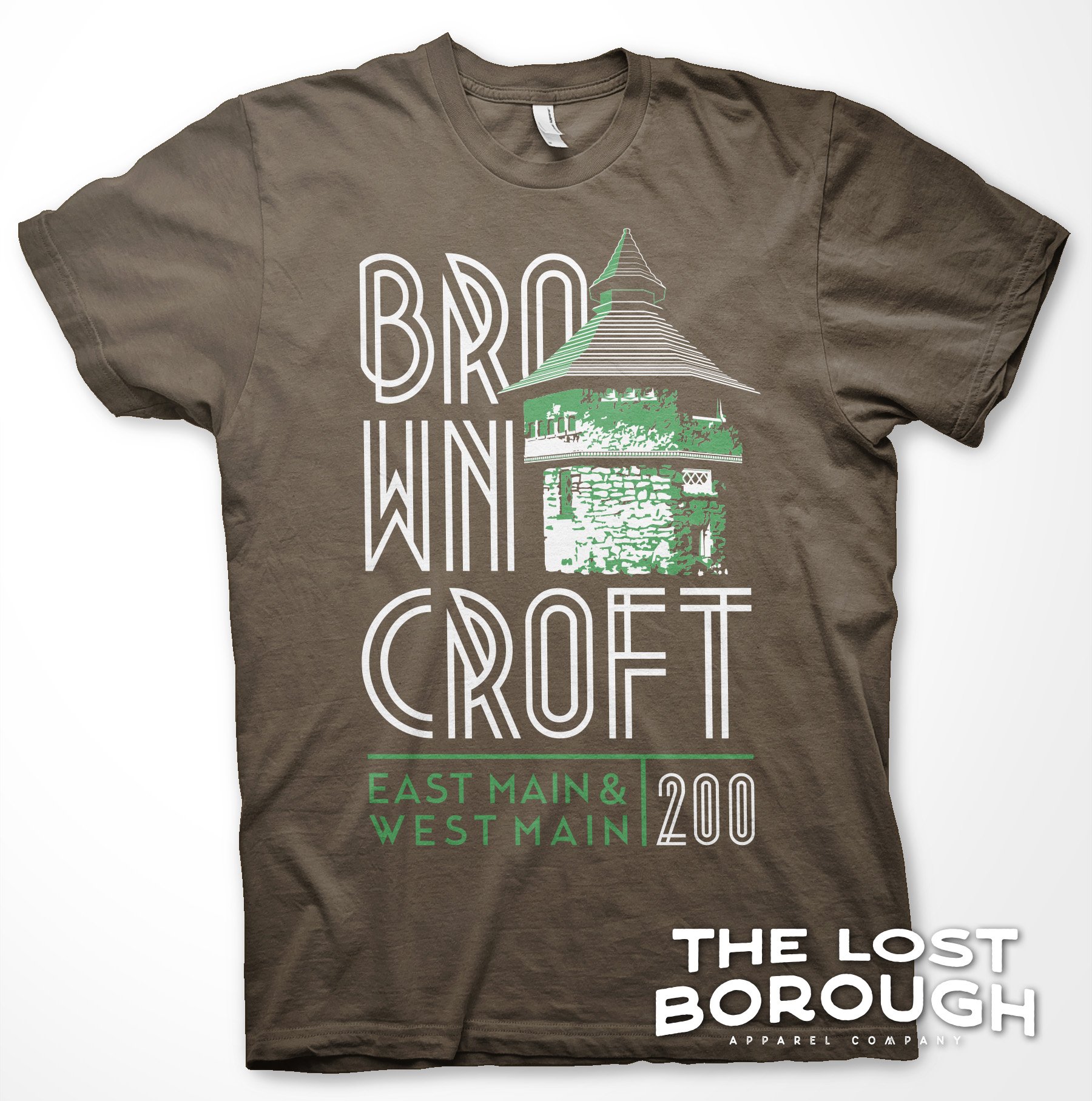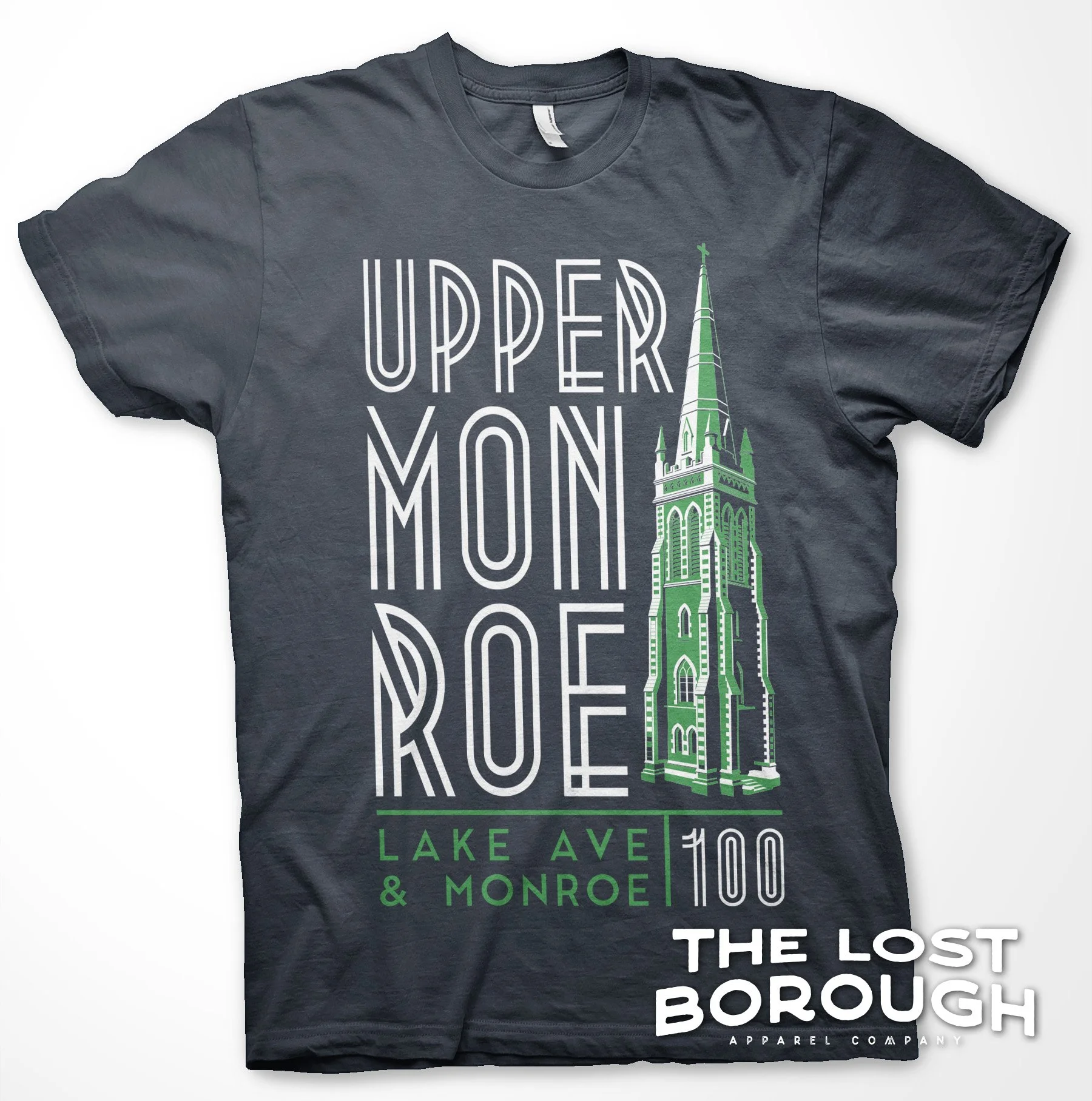 Image 1 of 2
Image 1 of 2

 Image 2 of 2
Image 2 of 2



Southwedge
One of the most eclectic and colorful neighborhoods in the entire city, Southwedge has an incredible atmosphere and vibe all its own. Once a working class neighborhood housing the crews that dug the Erie Canal through the heart of the city, Southwedge grew a nefarious reputation into the 60s and 70s, followed by a renaissance of culture and community that evolved into what we know today.
Maintaining its eclectic nature, we celebrate the neighborhood by recognizing its unique advancements. The woolen grey of the shirt is one such celebration that garnered national recognition: the Max Lowenthal and Sons Knitting Company, eventually becoming Rochester Knitting Works. Founded in 1872 and settling into the current Goodwill/ABVI building in 1910, the company was the first to stock mittens to Woolworth’s Department stores, and were very active in aiding the war effort during World War 2. The were present with the Army-Navy E award, for excellence in wartime production.
One lesser known, but thriving and successful, industry that centered itself within the neighborhood was the barge and boat building industry. By 1857, four boat yards dotted the landscape along South Clinton, with easy access to the then route of the Erie Canal, providing vessels for the immense trade and commerce on the canal. 1880 was the peak of production for the industry, and set a new record as no other city in the US produced as many canal boats. The wood accent colour of the design commemorates this historic achievement.
And lastly, to celebrate a truly unique Southwedge historical event, the featured illustration is of a Henry E. Sharp designed stained-glass window, that proudly resides within the Calvary St. Andrews, a former Episcopal and Presbyterian church, and was home to an incredibly progressive preacher named Algernon Crapsey. Crapsey ministered from 1879 to 1906 at the church, and was widely known for his foreward thinking views on faith and community. His wife Adelaide and him established classes and training for residents and children at the church and parish, as well as providing the first instance of kindergarten in Rochester. He lectured at Black Episcopal churches, led retreats for the Sisters of St. Mary, and founded the CItizens Political Reform Association and St. Andrews Brotherhood. Both entities were heavily focused on social and civil improvement. Amongst his vast achievements, Crapsey is also widely known as one of the last Christian clergy members to be convicted of heresy. That charge never slowed his social work and he continued on teaching and lecturing, served as a parole officer and officiant of weddings and funerals, and gave counseling. A truly remarkable man, truly committed to the betterment of his community.
Rochester's long stretching network of trolley routes serviced the far reaches of the city; The 700 line of North Clinton and South Clinton avenue traveled the length of Clinton Avenue, from the eastern border of the South Wedge, north through Center City and into the 14621 neighborhood, ending at Ridge Road.
One of the most eclectic and colorful neighborhoods in the entire city, Southwedge has an incredible atmosphere and vibe all its own. Once a working class neighborhood housing the crews that dug the Erie Canal through the heart of the city, Southwedge grew a nefarious reputation into the 60s and 70s, followed by a renaissance of culture and community that evolved into what we know today.
Maintaining its eclectic nature, we celebrate the neighborhood by recognizing its unique advancements. The woolen grey of the shirt is one such celebration that garnered national recognition: the Max Lowenthal and Sons Knitting Company, eventually becoming Rochester Knitting Works. Founded in 1872 and settling into the current Goodwill/ABVI building in 1910, the company was the first to stock mittens to Woolworth’s Department stores, and were very active in aiding the war effort during World War 2. The were present with the Army-Navy E award, for excellence in wartime production.
One lesser known, but thriving and successful, industry that centered itself within the neighborhood was the barge and boat building industry. By 1857, four boat yards dotted the landscape along South Clinton, with easy access to the then route of the Erie Canal, providing vessels for the immense trade and commerce on the canal. 1880 was the peak of production for the industry, and set a new record as no other city in the US produced as many canal boats. The wood accent colour of the design commemorates this historic achievement.
And lastly, to celebrate a truly unique Southwedge historical event, the featured illustration is of a Henry E. Sharp designed stained-glass window, that proudly resides within the Calvary St. Andrews, a former Episcopal and Presbyterian church, and was home to an incredibly progressive preacher named Algernon Crapsey. Crapsey ministered from 1879 to 1906 at the church, and was widely known for his foreward thinking views on faith and community. His wife Adelaide and him established classes and training for residents and children at the church and parish, as well as providing the first instance of kindergarten in Rochester. He lectured at Black Episcopal churches, led retreats for the Sisters of St. Mary, and founded the CItizens Political Reform Association and St. Andrews Brotherhood. Both entities were heavily focused on social and civil improvement. Amongst his vast achievements, Crapsey is also widely known as one of the last Christian clergy members to be convicted of heresy. That charge never slowed his social work and he continued on teaching and lecturing, served as a parole officer and officiant of weddings and funerals, and gave counseling. A truly remarkable man, truly committed to the betterment of his community.
Rochester's long stretching network of trolley routes serviced the far reaches of the city; The 700 line of North Clinton and South Clinton avenue traveled the length of Clinton Avenue, from the eastern border of the South Wedge, north through Center City and into the 14621 neighborhood, ending at Ridge Road.
Unisex Cut:
Shirt Color: Heather Grey
Shirt Type: 50/50 Poly-Cotton Athletic Fit T-Shirt










